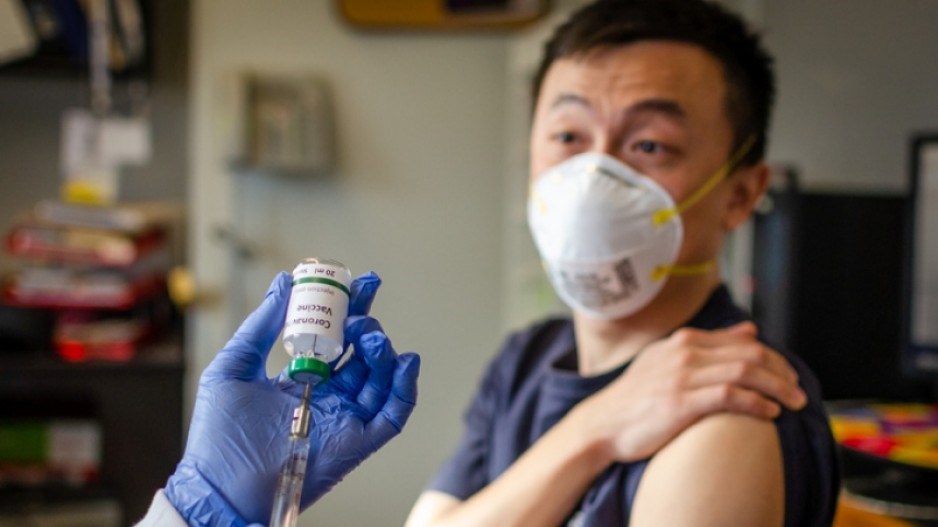Further delays to COVID-19 vaccine deliveries are “proving to be a challenge” for B.C.’s vaccination strategy, according to the province’s top doctor.
“We are working with what we have available to best address those most at risk,” B.C. provincial health officer Dr. Bonnie Henry said during a Friday (Jan. 29) briefing.
“But starting next week we will be getting back on track. It will be slow and slower than we wanted. But we are confident that we will be able to meet our Phase 1 and Phase 2 objectives as quickly as we possibly can.”
So far 124,979 British Columbians have received their first dose, while another 4,262 have received a second dose for a total of 129,241 vaccinations administered since December.
That’s up from the 127,255 vaccinations that had been administered as of Thursday.
Henry also confirmed all long-term care residents and staff have been offered vaccines across all health authorities in B.C., but later clarified not all were eligible to be immunized.
Canada and B.C. are dealing with ongoing shortages of the joint Pfizer Inc. and BioNTech SE vaccine amid efforts to expand production capacity at its manufacturing facility in Belgium.
Moderna Inc. is also reducing its next shipment to Canada by about 20% amid production delays, however, Prime Minister Justin Trudeau said earlier on Friday deliveries will resume normally afterward.
He also insisted Canada remains on track to receive all of its previously guaranteed doses set for the first quarter of 2021.
“It took us a little bit by surprise. We had not heard that there was going to be a shortage, though there has been some rumours swirling,” Henry said regarding the temporary reduction in Moderna doses.
“It is going to be a challenging few weeks and that’s really frustrating.”
On Monday, Henry revealed the deliveries the province was previously expecting for next week have been “dramatically reduced” even after Pfizer made no deliveries to Canada this week.
The B.C. government is now stretching the gap between first and second doses (both the Pfizer and Moderna vaccines require two doses) from 35 days to 42 days as a result of the shortages. Pfizer recommends 21-28-day gaps but Henry emphasized in early January that evidence shows that the vaccines are still effective even if that gap is extended to 42 days.
After already receiving her first dose, Henry said she believes in the continued efficacy of the 42-day gap and will be waiting until then to receive her second dose.
The province confirmed Thursday it now expects Pfizer to deliver 485 vaccine trays rather than 557 trays by the end of March.
Each tray carries 975 doses, meaning B.C. will receive 472,875 doses instead of an expected 543,075 doses.
Meanwhile, the European Union has been floating to idea of imposing export controls on vaccines produced within its member states to ensure supply for EU members is prioritized.
The potential measures would mean countries in which vaccines are manufactured would require approval to ship to non-EU countries.
Trudeau said Friday he’s received assurances from European Commission President Ursula von der Leyen that those measures will not affect the delivery of vaccines to Canada.
Last week, the province unveiled its plans for vaccinating the general population once vulnerable groups and at-risk workers are inoculated by the end of March.
The strategy entails four distinct phases and is based primarily on age groups in an effort to administer doses to 4.3 million eligible British Columbians by the end of September (residents under the age of 18 are not currently eligible).
B.C.’s latest vaccination update comes the same day Trudeau announced new international travel restrictions for the country.
All flights to Mexico and the Caribbean will be suspended beginning Sunday, and all international flights must land only in Vancouver, Calgary, Toronto and Montreal.
Travellers who arrive in those cities will be required to take a PCR (polymerase chain reaction) test at the airport to determine if they have COVID-19.
Those travellers will then be required to wait at an approved hotel for up to three days at their own expense as they await test results.
Trudeau estimated the cost of the hotel stays would run about $2,000.
Those who test negative will be able to quarantine at home, while those international travellers who test positive will be sent to a designated government facility to quarantine.
“You should not be thinking about international travel for vacations for leisure in the next few months. If we can get this under control and get people protected, we can have a summer again. Let’s think about that,” Henry said in response to the new federal measures.
She added discussions are ongoing regarding further restrictions to other destinations.
“I expect we’ll hear more,” Henry said.



.jpg;w=120;h=80;mode=crop)